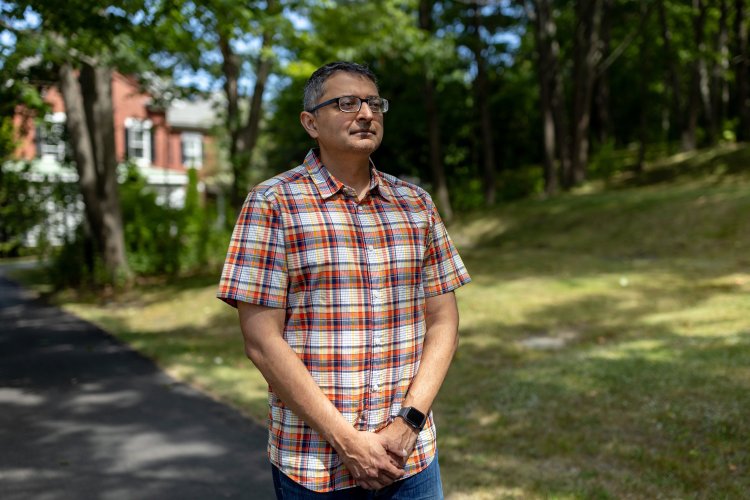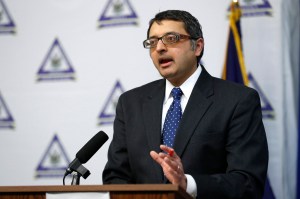
BRUNSWICK — Maine’s former CDC director, Dr. Nirav Shah, is considering a run for governor. If he jumped in, he would become a high-profile candidate in a crowded field in the 2026 race.
“I think we are in a moment where all of us should be considering running for something,” Shah said in a wide-ranging interview with the Press Herald Friday. “I’m considering throwing my hat into the governor’s race.”
Shah, of Brunswick, said that if he ran, it would be as a Democrat.
If Shah were to vie for the job, he would join a field of 18 candidates who already have announced they are running. He would have to defeat a number of prominent Democrats to win the party primary, including Secretary of State Shenna Bellows; former Senate President Troy Jackson; Hannah Pingree, a former Mills administration official and the daughter of Rep. Chellie Pingree; and Angus King III, a renewable energy entrepreneur and the son of Sen. Angus King.
“I’m considering, but have not yet committed to running,” he said. He said he didn’t have a timetable for when he would make a decision.

Shah, 48, became the face of Maine’s response to the COVID-19 pandemic and went on to become a top federal health official during the Biden administration. He recently launched a public health education program at Colby College, where he is a visiting professor.
Shah had a high-profile role as the director of the Maine Center for Disease Control and Prevention during the pandemic, when he often appeared on TV and online explaining the coronavirus to the public and answering journalists’ questions. Chocolate bars were named after him, coffee mugs were inscribed with the words “In Dr. Shah We Trust,” and he enjoyed a large online fan club.

Shah said on Friday that his experience in Maine, working for the Mills administration and launching the state’s COVID-19 response made him appreciate how state government can make a difference in people’s lives.
“What attracted me in particular to the governor’s office is the impact you can have in the executive branch,” Shah said.
Brian Duff, an associate professor of political science at the University of New England, said Shah would be a formidable candidate in the Democratic primary.
“He would be right in the mix for the Democratic nomination,” Duff said. “He has great name recognition and he had a knack for being a trusted communicator during the pandemic.”
But Duff said Shah is still untested on the “bare-knuckle” political attacks that occur during a high-profile campaign.
As a result of the state’s response to the pandemic, Maine had one of the highest COVID-19 vaccination rates in the nation, at more than 80% fully vaccinated.
Shah said on Friday that one of the moments from the pandemic that stuck with him was appearing on the Maine Public radio show “Maine Calling” and persuading a skeptical man to get the COVID-19 vaccine.
“‘You know what Dr. Shah, I think I am going to get that vaccine,'” Shah said he recalled the man saying. It was a proud moment, he said, adding that not being dismissive of people, and listening to their concerns, would go a long way toward being an effective governor.
Shah left Maine in 2023 after being tapped by the Biden administration to become principal deputy director of the U.S. Centers for Disease Control and Prevention in Atlanta. While at the U.S. CDC, Shah helped lead the response to the bird flu.
Shah also helped during the transition from the Biden to the Trump administration, where his last day on the job was Feb. 28.
Shah said even during the six-week transition period during the beginning of the Trump administration when he was still at the U.S. CDC, he saw worrying signs that Robert F. Kennedy Jr., the health and human services secretary, would undermine the agency’s mission.
Shah said despite being part of the transition team and one of the top U.S. CDC officials, he never met with Kennedy, despite requests to do so.
Kennedy’s Make America Healthy Again movement, focused around issues like dyes and seed oils in food, is “small ball,” Shah said, while damaging the nation’s vaccine system could end up drastically harming the health of Americans.
“MAHA is an appearance of science, but it’s really a wellness grift,” Shah said.
Kennedy’s decision to terminate $500 million in further research into mRNA vaccines, the technology used for the COVID-19 vaccines, is a blow to science and potentially the future development of promising vaccines, Shah said.
“It was a foolhardy decision,” Shah said. “You want as many horses in the race as possible when researching vaccines. We are less safe when taking that horse (mRNA research) out of the race.”
Shah is originally from Wisconsin and the son of Indian immigrants. He previously worked in public health in Cambodia and for the Illinois state government, where he was embroiled in a controversy over a Legionnaires’ disease outbreak. He has degrees in medicine and law from the University of Chicago. Shah lives in Brunswick with his wife, Kara Palamountain, a research professor at Northwestern University.

We invite you to add your comments. We encourage a thoughtful exchange of ideas and information on this website. By joining the conversation, you are agreeing to our commenting policy and terms of use. More information is found on our FAQs. You can modify your screen name here.
Comments are managed by our staff during regular business hours Monday through Friday as well as limited hours on Saturday and Sunday. Comments held for moderation outside of those hours may take longer to approve.
Join the Conversation
Please sign into your CentralMaine.com account to participate in conversations below. If you do not have an account, you can register or subscribe. Questions? Please see our FAQs.